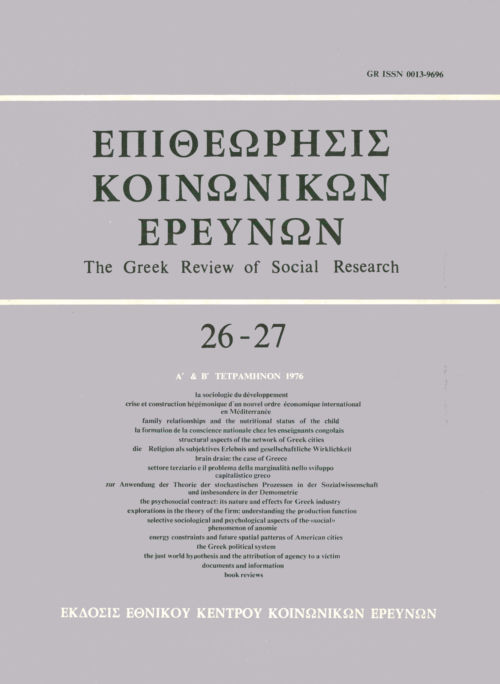The psychosocial contract: Its nature and effects fro Greek industry
Abstract
The basic focus of this paper lies in the definition
of the «psychosocial contract» as a new concept in
organization theory, and the discussion of its potential
theoretical and practical usefulness. This
concept derived out of a research study in the Greek
industry and is supported by current organization
theory and traditional political philosophy.
The basic problem of the Greek study centered
around the topic of success of industrial firms
within the Greek economy, success being defined in
terms of a systems-effectiveness model. The findings,
while supporting previous contingency theories
developed in other Western industrial settings,
further extended them by adding «Social Accountability
» as a major predictor of organizational
success. A conceptual model, supported by the
Greek data, provided an adequate explanation of
differences in success among Greek industrial firms,
and suggested a workable «psychosocial contract.»
The psychosocial contract, as a theoretical construct,
helped to explain the Greek data more
conveniently than would be possible without it.
Article Details
- How to Cite
-
Nicolaou-Smokovitis, L. (1976). The psychosocial contract: Its nature and effects fro Greek industry. The Greek Review of Social Research, 26, 110–128. https://doi.org/10.12681/grsr.215
- Issue
- 1976: 26-27 Α'-Β'
- Section
- Articles

This work is licensed under a Creative Commons Attribution-NonCommercial 4.0 International License.
Authors who publish with this journal agree to the following terms:
- Authors retain copyright and grant the journal right of first publication with the work simultaneously licensed under a Creative Commons Attribution Non-Commercial License that allows others to share the work with an acknowledgement of the work's authorship and initial publication in this journal.
- Authors are able to enter into separate, additional contractual arrangements for the non-exclusive distribution of the journal's published version of the work (e.g. post it to an institutional repository or publish it in a book), with an acknowledgement of its initial publication in this journal.
- Authors are permitted and encouraged to post their work online (preferably in institutional repositories or on their website) prior to and during the submission process, as it can lead to productive exchanges, as well as earlier and greater citation of published work (See The Effect of Open Access).



